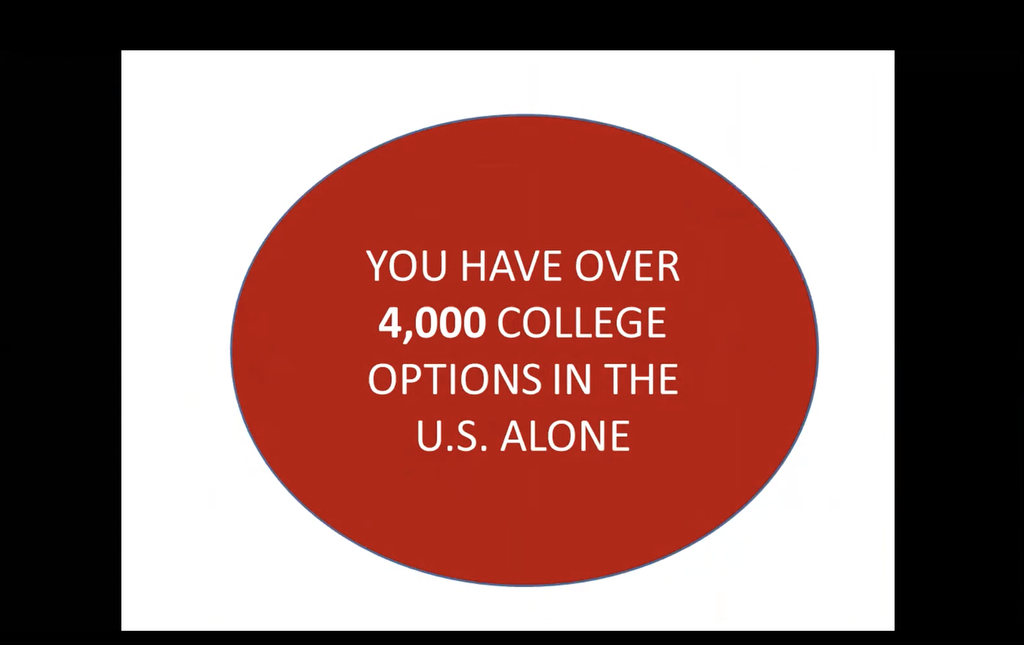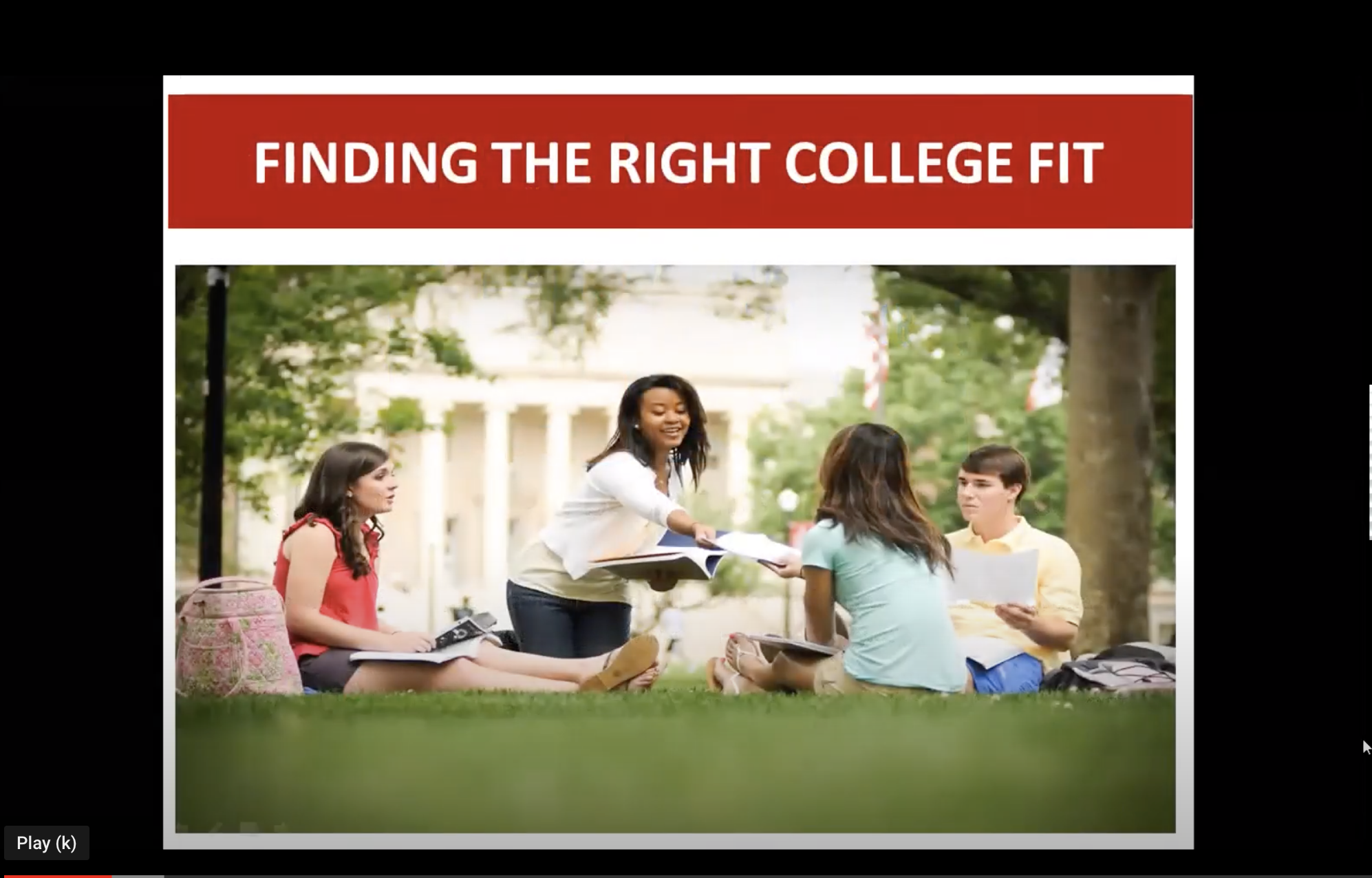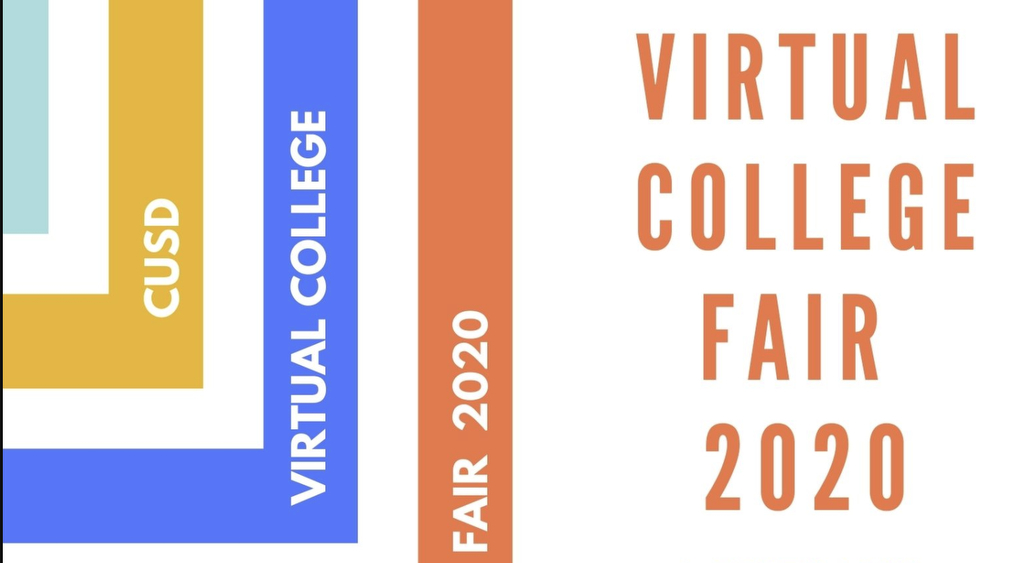By Lou Ponsi
The first ever virtual College Fair hosted by Capistrano Unified School District’s Futureology program was a huge success.
Between the College Showcase, Virtual College Tables and 14 Breakout Sessions, CUSD officials estimate that between 2,500 to 3,000 people attended the fair, numbers similar to the district’s in-person fairs from past years, said Anthony Russomanno, College and Career Guidance Coordinator for CUSD.
More than 500 viewed the two college showcases held on the first day, Russomanno said.
Breakouts that were the most popular were “Finding A College That FITS – How to Choose the Right School for YOU” and “Financial Aid Overview and FAFSA Support” he said.
Students and parents were also able to watch and record all parts of the fair, which took place Oct. 12-15, 2020.
Two college showcases took place running concurrently with the virtual college table displays.
The college showcases included 80 back-to-back, three-minute live highlights from all varieties of schools, with presenters talking about what makes each program unique.
The college showcase provided the opportunity for parents and students to get basic information on a variety of institutions from all over the country in one sitting.
For example, parents and students watching the presentation from the University of Miami learned the university was home to more than 10,000 undergraduates, representing more than 100 nations with 180 majors and an average class size of 16 to 27.

Those watching the presentation learned that Bard College in Annandale-on-Hudson, New York, discovered that Bard was a private liberal arts located 90 miles north of New York City. Bard is also the first college in the country to offer a human rights major.
A representative from the FIDM/Fashion Institute of Design & Merchandising in downtown Los Angeles discussed how FIDM offers associates and bachelors degrees along with an MBA program.
Other schools delivering three-minute presentations included the Laguna College of Art and Design, the University of Delaware, California State University, Maritime Academy and the University of Hawaii at Hilo.
Parents and students were able to speak with college representatives in detail at virtual college table visits, which also took place Oct. 12, 2020.
Every breakout session, college showcase, and virtual college table visit was recorded and can be viewed at www.cusd-futureology.org/college-fair.
Breakout sessions
Breakout sessions on 14 topics took place Oct. 13-15.
Topics included: College Options for Students with Learning Differences, Researching Majors in your College Search, California Dream Act Presentation, College Planning from a Parent ‘s Perspective, Ins & Outs of SAT & ACT Testing during COVID Uncertainty and Transfer Success from Community College.
Here are highlights from three breakout sessions:
Options for Students with Learning Differences
Representatives from Michigan State University and the University of Wisconsin Whitewater hosted this breakout session to discuss the services offered by their respective schools for students with learning disabilities.
Sara Vogt, disability services coordinator at Wisconsin Whitewater, and Larry Alterman, admission counselor at Michigan State, provided valuable pointers for students with disabilities on how to search for the college or university that will be the right fit for their particular disability.
Disabilities include physical disabilities, blind or low vision, deaf or hard of hearing, Vogt said.
“The majority have invisible or non-apparent disabilities and a lot of students have multiple disabilities,” Vogt said.
Non-apparent disabilities can include psychological disabilities such as anxiety and depression, autism, ADD and other chronic health conditions, she said.
“All of these students, have been successful, can be successful in college and are eligible for services at our university and actually all universities and colleges,” Vogt said.

Visiting the website for “50 Best Disability Friendly Colleges and Universities,” is a good place to start, she said.
Wisconsin Whitewater is No. 20 on that list.
Alterman encouraged students to ask plenty of questions when researching potential college choices.
“All students need to understand the cost of attendance,” Alterman said. “This is about you creating your own priority list.”
Questions included:
- How are the classes taught? It is it lecture or more discussion based?
- What kind of tutoring options are there?
- Are there placement tests?
- What does campus accessibility look like? Accessibility means a lot of things. Is it a fit for you?
- What kind of personal care options are there?
- What kind of adaptive and assisted technology is there?
- Are there summer bridge programs to aid in the transition.
“I can’t advise enough to visit campus,” Alterman said. “Try out accessibility features. Meet with disability services staff. Many campuses offer different options for you to meet with students and communicate with students with disabilities. You need to choose a school that is the right fit. And really investigate … that is how you find out.”
How to Research Careers and Majors in your College Search
Choosing a major can be a daunting experience.
For students undecided on what major to choose, Camille Crites, Southern California admissions rep for Syracuse University, Crites says take a deep breath.
This is common, Crites said.
“You don’t need to know what you are going to do for the rest of your life,” Crites said. “If you haven’t decided yet, you are definitely able to do that.”
College is the time to explore, she said. There are careers out there that students entering college may not have even heard of yet.
There are also careers that don’t even exist yet, Crites said.
For the majority of college students, your major does not define your career, so don’t worry, said Chuck Liddiard, Assistant Director of West Coast Admissions, University of Delaware.
College students often change their majors anyway, Liddiard said.
“If you are a high school senior, (ask) what colleges on my list allow me to explore,” Liddiard said.
When choosing college classes, Crites said students should choose those they are most passionate about — the classes that when the bell rings, you can’t believe the class is already over.
Students should consider the activities they enjoy most, the kinds of articles they read in their spare time and what their personal characteristics are.
Students can ask themselves: Are you creative? Analytical? Entrepreneurial? Self-motivated? Structured? What are you good at? What challenges you?
Students who excel at math, for example, may want to consider careers in engineering, information technology, accounting, finance or sports analytics.
“Think about your dream,” Crites said. “What do you see yourself doing 10 or 12 years from now?”
Transfer Success from Community College
Attending a community college with the intention of then transferring to a four-year college or university can be a smart option for students starting out on the path of higher education.
Whether a student’s plan is to save money during the first two years of college, or earn extra units during the summer that will transfer to a four-year school in the fall, starting out at a community college such as Saddleback will increase the chances of being admitted to your college of choice, said Terrie Butorac, transfer center counselor at Saddleback.
Students who start out at Saddleback before transferring to a four-year school, can save from $16,500 to $109,700, depending on what four-year school they attend, Butorac said.
“Attending Saddleback first gives you a more affordable college experience,” Butorac said.
Saddleback’s honors program also has transfer agreements with several four-year colleges and universities, the counselor said.
Saddleback has a transfer center which offers a variety of services to transfer-bound students. The center provides individual counseling, hosts transfer fairs and workshops, organizes campus tours of four-year colleges and hosts university representatives who meet with Saddleback students.
All high schools in the CUSD has at least one Saddleback counselor assigned to their school.
For more information, visit http://www.cusd-futureology.org/college-fair.

